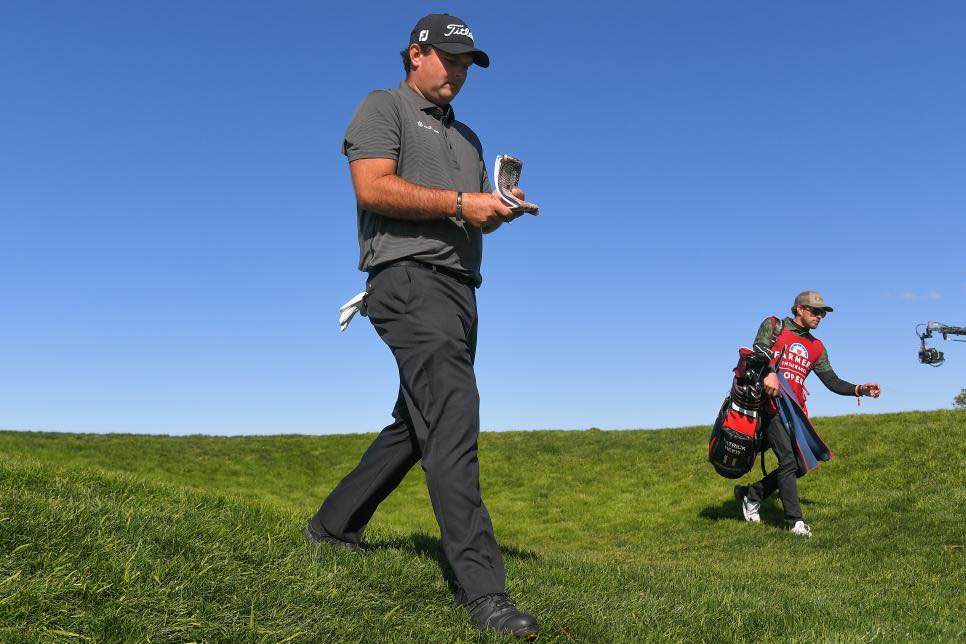In the aftermath of Patrick Reed’s rules controversy at the 2019 Hero World Challenge, where he was penalised two strokes for twice sweeping sand from behind his ball on practice swings and dealt with the “cheater” label, Paul Azinger opined, “It’s pretty important for Patrick Reed to get it right at this point in his career, and he’s going to have to get it right for a long time to come. We’re going to watch him like a hawk with the cameras.”
Those words resonated on Saturday in the Farmers Insurance Open, when Reed found himself in the middle of another rules brouhaha that was fuelled by video reviews and the commentators on the CBS broadcast.
Reed, having shot 5-under 31 on the front nine and leading the tournament by four strokes at the time, hit a fairway bunker shot on the South Course’s par-4 10th hole that came to rest in the rough to the left of the green. On the broadcast, Reed was shown calling over rules official Brad Fabel, though – and this is where the second-guessing began – he already had removed his ball from what he determined was an embedded lie that affords him a free drop.
Co-leader Patrick Reed recaps his third round, including the 10th hole ruling. pic.twitter.com/lgv82A2hlv
— PGA TOUR (@PGATOUR) January 31, 2021
“They [the marshals] said it didn’t bounce,” Reed told the official, “so I checked it and I believe it broke ground. But I want you to make the call.”
“What are you talking about?” Fabel asked.
“Embedded ball,” Reed said.
Of course, by then, the official couldn’t make a clear determination of Reed’s lie.
Reed repeated, “It seems like it broke ground, but I want you to double check. They said it didn’t bounce.” Reed poked his finger into an indention in the deep grass and the official also did so to feel if there was a “lip” created by the plugged ball.
Reed was allowed to take a drop without penalty and made a 14-foot putt for a par save. He faltered from there, suffering bogeys at the 11th, 13th, 14th and 16th, with a horseshoe lipout on a birdie try at 17, and finished with a 2-under-par 70 that has him tied for the at 10-under with Carlos Ortiz (66).
The question about Reed’s decision got more interesting when, several minutes after Reed finished the 10th, CBS showed a replay of his approach at the hole, the ball taking a knee-high bounce before settling down, contradicting what Reed said he was told.
“I’ve never seen a ball plug on the second bounce,” said CBS analyst Nick Faldo after seeing the replay.
CBS anchor Jim Nantz said of the circumstances, “The optics aren’t great.”
After the round, lead PGA Tour Senior Tournament Official John Mutch reviewed the videotape with Reed and playing parners Will Gordon and Robby Shelton, and he determined that Reed handled the situation properly, including asking a volunteer if the ball had bounced and notifiying his playing partners that he believed he had an embedded ball. Mutch said in an interview with reporters that Reed was entitled to determine if his ball was embedded without the help of a rules official.
PGA TOUR rules official Ken Tackett discusses Reed's embedded ball. pic.twitter.com/DGsiTK0Wq4
— PGA TOUR (@PGATOUR) January 31, 2021
“It was reasonable for him to conclude that that was his ball, it did not bounce and he was then entitled to see if it was embedded,” Mutch said.
After the round, a seemingly relaxed and composed Reed was run through a gantlet of media outlets who were asking the same questions about the controversy.
“It’s an unfortunate situation, obviously,” Reed said, “but at the end of the day when you finish a round, and the head rules official comes up to you and has the video and shows everything that went down to the whole group and says that you’ve done this perfectly, you did this the exact right way, the protocols you did were spot on – at that point, I feel great about it.”

There was one aspect of Reed’s explanation that may follow him into the future: He admitted that he would not have checked for a plugged lie had he known his ball bounced because it would be “nearly impossible” for it to have become embedded.
“The only thing I would have done differently, if we saw the ball bounce or if someone said the ball bounced, then I never would have marked the golf ball,” Reed said. “You would have just played it as it lies. You know when the ball bounces it’s almost impossible for it to break the plane and so, therefore, when that happens, anytime you see the ball bounce you just play it as it lies.
“But since you have three players, three caddies and a volunteer … that didn’t see the ball bounce, then you obviously are going to go off of that.”

